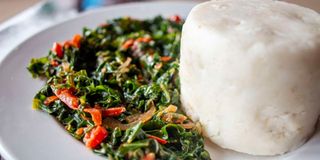No 'mboga saucer' in Kisumu eateries as drought bites

A plate of Ugali and greens. There is shortage of vegetables in Kisumu, driving the cost up.
For many families, affording beef, chicken or fish every week is usually a challenge.
Many in Kisumu have often settled for what is referred to as the “poor man’s meal” — omena (sun dried silver cyprinid fish) — but on many occasions, they settle for vegetables such as sukuma wiki or cabbage with a little soup.
However, the harsh economic times, coupled with drought, means many poor families in Kisumu are going to bed on an empty stomach, following the rising cost of vegetables.
With the drought, farms are dry and this has caused a major shortage of the popular sukuma wiki, cabbage and other indigenous vegetables, which are usually the affordable meal on many tables.
For Kisumu, which imports most of its vegetables from Vihiga, Kisii and some parts of South Nyanza and Rift Valley, the shortage is affecting thousands of consumers of the vegetables.
The shortage is alarming, as traders and consumers scramble for the little that comes to the lakeside city.
Some consumers have resorted to eating cabbage leaves in order to get their fix of the vegetable.
While the leaves are edible and can be used in a variety of dishes, they are not as sweet and nutritious as the actual cabbage head.
“I used to buy a cabbage at Sh50, today one piece goes for Sh170, which is too expensive for me. I am now opting for the cabbage leaves,” said Ms Norah Dide.
Mr James Khaemba, a cleaner, told the Nation that kale (sukuma wiki) is rare, but when it lands at the market, people fight for it.
“We collect more of remains of other greens like cabbages that are supplied in bulk with a different flow of supply,” said Mr Khaemba.
Skipping veges
Others have simply decided not to eat vegetables, because of the high prices and scarcity.
“I am a mother of five. Months ago, I could buy sukuma wiki worth Sh20 and it would be enough to feed my family. Today, I need at least Sh80 to buy enough to feed us. Sometimes we are forced to eat ugali with tea,” said Ms Carolyn Adhiambo.
The indigenous vegetables, popularly referred to as kienyeji, are scarce.
The shortage of vegetables is believed to be as a result of the extended drought spell, transportation costs and distribution challenges.
Vegetable sellers have been struggling to meet the demand of their customers. Some traders have temporarily stopped selling until the situation improves.
Ms Jane Adega, a grocer, says she has been struggling to keep up with the demand for vegetables, which has become increasingly scarce and expensive.
“One sack of sukuma wiki and spinach used to go for Sh1,500, today the price of one sack is Sh6,000, making it difficult for me to realise any reasonable profit margin,” she said.
Another vegetable seller, Beldina Adhiambo, has stopped selling vegetables until the situation improves. I can’t afford to pay Sh6,000 for a sack of sukuma wiki,” she said.
One of the suppliers of sukuma wiki explained that they increase the prices because they also get the commodity at high prices from farmers and the cost of transportation from Kitale is high.
Restaurants are affected too.
In the past, vegetables were served for free for a customer who bought stew or eggs, popularly known as ‘mboga saucer’. Today they have to part with Sh10 for the vegetables whose quantity has also been reduced.
The hot sun is also taking a toll on the vegetables, turning their colour and texture. Traders have to continue sprinkling water on their produce to keep them fresh.
“No one buys the kale when it turns brown; it is not acceptable,” said Mr Thomas Oduor, a buyer.
He pointed out that the lesson for households is that they must have kitchen gardens.





